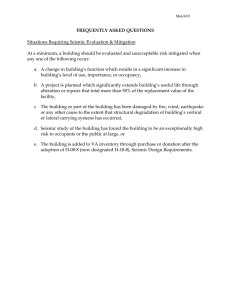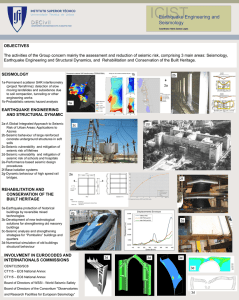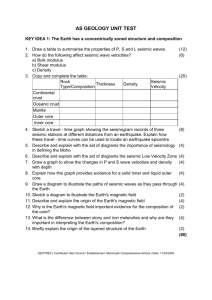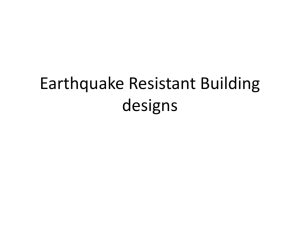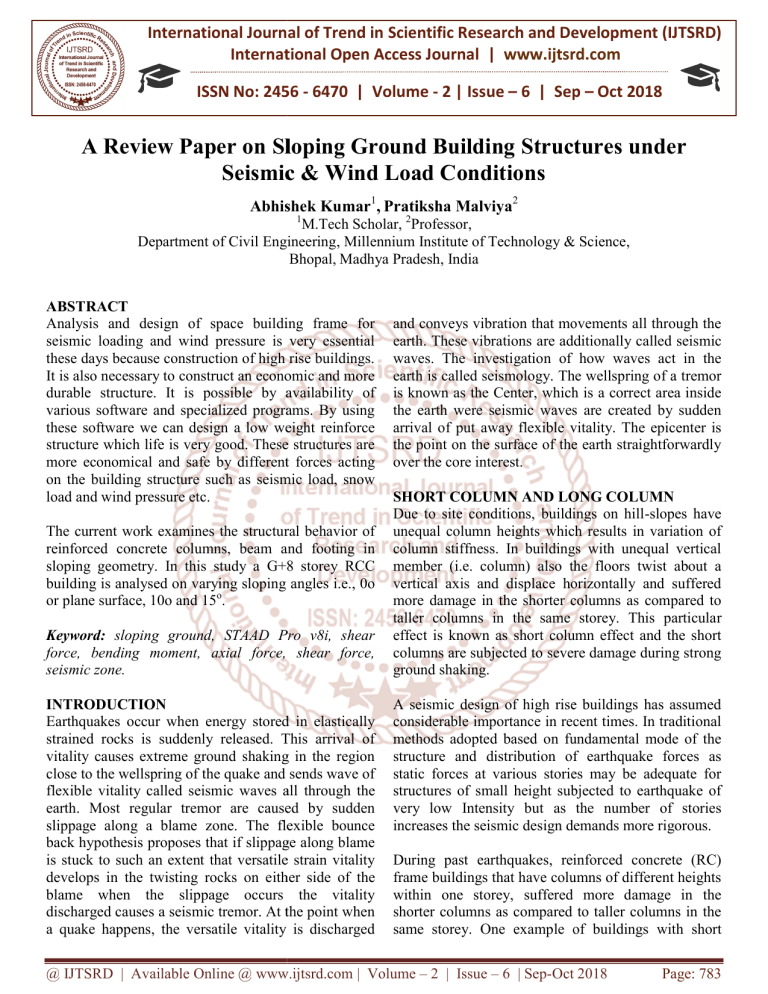
International Journal of Trend in Scientific Research and Development (IJTSRD)
International Open Access Journal | www.ijtsrd.com
ISSN No: 2456 - 6470 | Volume - 2 | Issue – 6 | Sep – Oct 2018
A Review Paper on
n Slop
Sloping
ing Ground Building Structures under
u
Seismic & Wind Load Conditions
Abhishek Kumar1, Pratiksha Malviya2
1
M.Tech Scholar, 2Professor,
Department of Civil Engineering
Engineering, Millennium Institute of Technology & Science,
Science
Bhopal, Madhya Pradesh, India
ABSTRACT
Analysis and design of space building frame for
seismic loading and wind pressure is very essential
these days because construction of high rise buildings.
It is also necessary to construct an economic and more
durable structure. It is possible by availabi
availability of
various software and specialized programs. By using
these software we can design a low weight reinforce
structure which life is very good. These structures are
more economical and safe by different forces acting
on the building structure such as seismic
ismic load, snow
load and wind pressure etc.
The current work examines the structural behavior of
reinforced concrete columns, beam and footing in
sloping geometry. In this study a G+8 storey RCC
building is analysed on varying sloping angles i.e., 0o
or plane surface, 10o and 15o.
Keyword: sloping ground, STAAD Pro v8i, shear
force, bending moment, axial force, shear force,
seismic zone.
INTRODUCTION
Earthquakes occur when energy stored in elastically
strained rocks is suddenly released. This arrival of
vitality causes extreme ground shaking in the region
close to the wellspring of the quake and sends wave of
flexible vitality called seismic waves all through the
earth. Most regular tremor are caused by sudden
slippage along a blame zone. The flexible bounce
back hypothesis proposes that if slippage along blame
is stuck to such an extent that versatile strain vitality
develops in the twisting rocks on either
ither side of the
blame when the slippage occurs the vitality
discharged causes a seismic tremor. At the point when
a quake happens, the versatile vitality is discharged
and conveys vibration that movements all through the
earth. These vibrations are additionally
ditionally called seismic
waves. The investigation of how waves act in the
earth is called seismology. The wellspring of a tremor
is known as the Center, which is a correct area inside
the earth were seismic waves are created by sudden
arrival of put away flexible vitality. The epicenter is
the point on the surface of the earth straightforwardly
over the core interest.
SHORT COLUMN AND LONG COLUMN
Due to site conditions, buildings on hill-slopes
hill
have
unequal column heights which results in variation of
column stiffness. In buildings with unequal vertical
member (i.e. column) also the floors twist about a
vertical axis and displace horizontally and suffered
more damage in the shorter columns as compared to
taller columns in the same storey. This particular
particula
effect is known as short column effect and the short
columns are subjected to severe damage during strong
ground shaking.
A seismic design of high rise buildings has assumed
considerable importance in recent times. In traditional
methods adopted based on
n fundamental mode of the
structure and distribution of earthquake forces as
static forces at various stories may be adequate for
structures of small height subjected to earthquake of
very low Intensity but as the number of stories
increases the seismic design
sign demands more rigorous.
During past earthquakes, reinforced concrete (RC)
frame buildings that have columns of different heights
within one storey, suffered more damage in the
shorter columns as compared to taller columns in the
same storey. One example
le of buildings with short
@ IJTSRD | Available Online @ www.ijtsrd.com | Volume – 2 | Issue – 6 | Sep-Oct
Oct 2018
Page: 783
International Journal of Trend in Scientific Research and Development (IJTSRD) ISSN: 2456-6470
2456
columns in buildings on a sloping ground can be seen
in the figure (1.3) given below.
Fig 1.3: Building frame with short columns
STAAD-pro V8i:STAAD pro is the leading design and structural
analysis software developed in Yorba Linda, CA by
Research Engineers International. In the late months
of year 2005, Research Engineers was brought by
Bentley Systems. It is quite user friendly and supports
a number of steel, timber and concrete design codes.
It can make utilization of different manifestations of
structural analysis from the conventional first order
static analysis, second order p-delta
delta investigation and
geometrical non-linear
linear analysis. These models can be
used in different forms of dynamic analysis from
model extraction
ion and response spectrum to time
history analysis.
STAAD.pro provides a very interactive user interface
that allows users to draw frame sections and input
load values and dimensions. According to specified
specifications, it analyzes the structure and finally
designs the members with reinforcement details for
the RCC frame.
Methods of Analysis:
Analysis is performed on the basis of behaviour of the
structure, external action, structural material and the
type of selected structural model. Depending on tthe
type of behaviour of the external verb and structure,
the analysis can be further classified as given below.
Equivalent static analysis:
All designs against earthquake load should be
considered on the dynamic nature of the load.
However, for ordinary general structures, analysis by
parallel linear analysis method is sufficient. This is
allowed in most exercises for regular, low
low-rise
buildings.
gs. Dynamic analysis is not included in this
system; however, it is estimated to be responsible for
the mobilization of the project. Firstly, the design base
shear is calculated for the entire building, and then it
is circulated with the height of the building.
b
At each
floor level, thus obtained, the lateral forces are
distributed for different side load resistance elements.
(Duggal S.K., 2010)
Nonlinear Static Analysis:
This is a convenient method in which the analysis is
done under permanent vertical load and it gradually
increases the lateral load to estimate the pattern of
distortion and damage to the structure. Nonlinear
static investigation is the technique for seismic
examination in which the structure is spoken to by the
conduct bend, which demonstrates
demon
the connection
between the base shear and the uprooting of the
rooftop. It is otherwise called false examination.
Response Spectrum Method:
In this method, peak responses of a structure are
received directly by earthquake responses during
earthquake.
Literature Survey
Several studies have been made to investigate the
structural performance of building frame resting on
sloping ground. The effect in terms of axial force,
shear force, moment support reaction, and
displacement are studied for more realistic
re
analysis to
quantify the effects of various slope of ground.
Chandrasekaran and Rao (2002) investigated
analysis and the design of multimulti storied RCC
buildings for seismicity. Reinforced concrete multimulti
storied buildings are very complex to model as
a
structural systems for analysis. Usually, they are
modeled as two- dimensional or three-dimensional
three
frame systems are in plane and slope with different
@ IJTSRD | Available Online @ www.ijtsrd.com | Volume – 2 | Issue – 6 | Sep-Oct
Oct 2018
Page: 784
International Journal of Trend in Scientific Research and Development (IJTSRD) ISSN: 2456-6470
2456
angles 5o, 10o, and 15o. A case history of a RC
structure, involved in the study, is briefly cited in the
paper. The current version of the IS: 1893 - 2002
requires that practically all multistoried buildings be
analyzed as three-dimensional
dimensional systems. This is due to
the fact that the buildings have generally irregularities
in plan or elevation or in both. Further,
urther, seismic
intensities have been upgraded in weaker zones as
compared to the last version IS: 1893
1893-1984. It has
now indirectly become mandatory to analyze all
multistoried buildings in the country for seismic
forces and comparing the axial force, shea
shear force,
moment, nodal displacement, stress in beam and
support reaction. This paper appraises briefly the
significant changes in the current version of the code
compared to the previous version.
Birajdar B.G. (2004) introduced the outcomes from
seismic investigations
nvestigations performed on 24 RC structures
with three unique setups like, Advance back building;
Advance back Set back building and Set back
building are displayed. 3 – D investigation including
torsional impact has been completed by utilizing
reaction range
nge technique. The dynamic reaction
properties
i.e. basic day and age, top story removal and, the base
shear activity actuated in sections have been
examined with reference to the appropriateness of a
building arrangement on inclining ground. It is seen
that Progression back Set back structures are observed
to be more appropriate on sloping ground
ground.
Kadid A. also, Boumrkik A. (2005) contemplated trial
weakling investigation was completed with an
examination the execution of encircled structures
under future expected seismic tremors. Slanting
ground is thinking about the three confined structures
with 5, 8 and 12 stories separately
arately were dissected. The
outcomes acquired in these three structures and think
about the pivotal power, bowing minute, nodal
relocation, base shear and demonstrates that
appropriately planned casings will perform well under
seismic codes by the authors are the push over
analysis is a relatively simple way to explore the
linear
Y. Singh and Phani Gade (2011) The structures in
bumpy zones must be arranged contrastingly because
of shortage of level ground. This paper introduces a
few perceptions about seismic conduct of slope
structures amid the Sikkim quake of September 18,
2011. A scientific examination is additionally
additi
performed to explore the impossible to miss seismic
conduct of slope structures. Dynamic reaction of slope
structures is contrasted and that of standard structures
on level ground in wording essential time of vibration,
example of between story float,
floa segment shear, and
plastic pivot development design. The seismic
conduct of two run of the mill arrangements of slope
structures is researched utilizing straight and nonnon
direct time history investigation. It is seen that slope
structures have altogether unexpected unique qualities
in comparison to structures on level ground. The
narratives promptly over the street level, if there
should be an occurrence of down-slope
down
structures, are
especially helpless against quake activity. The
scientific discoveries are
re authenticated by the harm
design saw amid Sikkim seismic tremor.
Yimeng Yang (2012) Confronting countless compose
complex auxiliary framework and dynamically perfect
tremor safe speculations, the ordinary programming
can never again address the issues of estimation and
investigation. In the mean time, some worldwide
limited component programs, for example, ETABS,
SAP2000, MIDAS/gen and SATWE, were refreshing
themselves yet stayed separate constraints. In this
paper, reaction range, time history and connecting
conn
section in-plan
plan stresses investigation were executed
joined with a down to earth venture by these projects,
which were additionally thought about after the
examination results.
Mohammed Umar Farooque Patel (2012) considered
the structures on slope contrast from different
structures. The different floors of such building
ventures back towards the slope incline and
atthesametimebuildingsmayhavesetbacksalso.Buildin
gssituatedinhillyareasae and more helpless against
seismic condition. In this examination,
examinatio
3D
investigative model of eight storied structures have
been created for symmetric and asymmetric building
Models and dissected utilizing auxiliary investigation
to ETABS" to contemplate the impact of shifting
stature of sections in ground story because of slanting
ground and the impact of shear divider at various
positions amid seismic tremor. Seismic investigation
has been finished utilizing Direct Static, Straight
Powerful technique and assessed utilizing sucker
examination Eight Storied building situated
situ
in zone
III of medium soil locales has been broke down.
Concentrate the status of the plastic pivots framed at
various areas in the structure when the structure
@ IJTSRD | Available Online @ www.ijtsrd.com | Volume – 2 | Issue – 6 | Sep-Oct
Oct 2018
Page: 785
International Journal of Trend in Scientific Research and Development (IJTSRD) ISSN: 2456-6470
2456
achieves its execution point. It is in this way vital to
consider the condition of pivots in the structure at
performance point.
The previous researches were done for other
seismic zones like
ke zone IV and V by considering
only square geometry of high rise buildings.
KeyvanRamin (2015) examined the exploratory
demonstrating and numerical displaying for a four
fourstory strengthened solid building that the examination
of basic 3-D
D casings of changing floor statures and
shifting numberr of straights with various incline edges
utilizing an extremely mainstream programming
instrument STAAD Professional on both a slanting
and a level part. Additionally Sap2000 programming
had been utilized to demonstrate that the uprooting of
floors is moree prominent for a level part working than
a slanting parcel building. Be that as it may, the
expansion in shear was observed to be very more
noteworthy in short segments contrasted with normal
ones and a gigantic minute ought to be endured by
slanting part structures. The more prominent firmness
of the structure was likewise uncovered by non
nonstraight static (Push-Over)
Over) investigation. As indicated
by the outcomes, short segment are required to have
more safe areas and are proposed to be strengthened
with moree bars. Likewise, more steel ought to be
utilized as stirrups than as longitudinal bars. Likewise
to exist structures, shear limit of short segments ought
to be retrofitted by FRP, Steel Coat or different
materials.
OBJECTIVES
To analyse problems of high rise RCC buildings
considering earthquake Zone III in different
geometries using Staad Pro V8i software.
To analyse the building at three different sloping
grounds (i.e., 0o, 10o and 150).
Zaid Mohammada (2016) Confined structu
structures built on
slope inclines indicate unexpected basic conduct in
comparison to that on the plain ground. Since these
structures are unsymmetrical in nature, subsequently
draw in huge measure of shear powers and torsional
minutes, and show unequal circulation
on because of
changing segment lengths. In present investigation,
two unique setups of slope structures have been
displayed and broke down utilizing ETABS v 9.0
limited component code. A parametric report has been
completed, in which slope structures are
geometrically
eometrically differed in stature and length. Taking
all things together.
PROBLEM IDENTIFICATION
Review of different papers related to the subject was
done. Some problems were identified such as:
as: In past, researchers have studied the shear
behavior of multi storey buildings for different
seismic zones.
Design of earthquake resistant multi storey RCC
building on
sloping ground with varying of
floor height and number of bays was done.
CONCLUSION
Analysis and design of space building frame for
seismic loading and wind pressure is very essential
these days because construction of high rise buildings.
It is also necessary to construct a economic and more
durable structure. It is possible by availability of
various software and specialized programs. By using
these software we can design a low weight reinforce
structure which life is very good. These structures
struct
are
more economical and safe by different forces acting
on the building structure such as seismic load, snow
load and wind pressure etc.
Reinforced concrete (RC) frame buildings are most
common type of constructions resting on plane and
sloping ground
nd (hilly area) in India. There buildings
are subjected to several types of forces during their
lifetime, such as static forces due to dead and live
loads and dynamic forces due to the wind and
earthquake.
Results from seismic analyses performed on three RC
buildings with three different ground slopes (0o ,10o,
15o) has been carried out by using static method. The
top storey displacement and the footing reaction, axial
force, shear and moment action induced in columns
and beams have been studied to investigate the
influence of sloping ground on structural performance
of building frame.
REFERENCE
1. Agrawal P. and Shrikhande M. 2006, Earthquake
resistant design of structures (Prentice-Hall
(Prentice
of
India Private Limited, New Delhi, India) Applied
Technology Council
ouncil (1996): Seismic Evaluation
and Retrofit of Concrete Buildings, ATC-40,
ATC
Vol.
1.
2. Athanassiadou C. J, 2008, Seismic performance of
R/C plane frames irregular in elevation,
Engineering Structures 30(2008):1250–1261.
30(2008):1250
@ IJTSRD | Available Online @ www.ijtsrd.com | Volume – 2 | Issue – 6 | Sep-Oct
Oct 2018
Page: 786
International Journal of Trend in Scientific Research and Development (IJTSRD) ISSN: 2456-6470
2456
3. Birajdar B. G., and Nalawade S. S. 20
2004. Seismic
Analysis of Buildings Resting on Sloping Ground.
In Thirteenth World Conference on Earthquake
Engineering (13WCEE). Vancouver, Canada,
Paper No.1472.
dimensional non-linear
linear static and dynamic
analysis, Structure Magazine, winter,
wi
1998
FEMA-356(2000),
356(2000), Pre standard and Commentary
for the seismic Rehabilitation of buildings,
American Society of Civil Engineers,USA.
4. Birajdar B. G., Nalawade. S. S., 13WCEE 2004
Seismic analysis of buildings resting on sloping
ground. Conference on Our World in Concrete &
Structures: 29 - 30 August 2002,Singapore.
14. KazemShakeri (2012),”An adaptive modal
pushover
procedure
for
asymmetric-plan
asymmetric
buildings”, Engineering Structures 36 (2012),
pp.160-172.
5. BIS. (2002). IS 1893 (Part 1) Indian Standard
criteria for Earthquake Resistant Design of
structures, Part 1: General Provisions and
buildings (Fifth Revision). New De
Delhi, Bureau of
IndianStandards.
15. Kumar, S., and Paul, D. K. (1998). A Simplified
Method for Elastic Seismic Analysis of Hill
Buildings. Journal of Earthquake Engineering 2 :(
2),241-266.
6. Bozorgnia
Y,
Bertero
V,
"Earthquake
Engineering: From Engineering Seismology to
Performance-Based
Based
Engineering",
CRC
Press,2004.
7. Chandwani Vinay, Agrawal Vinay, Gupta and
Naveen Kumar (2012), “Role of Conceptual
Design in High Rise Buildings.”, Vol. 2, Issue 4,
July-August 2012, pp.556-560.
8. Emraherduran (2008), “Assessment of current
nonlinear static procedures on the estimation of
torsional effects in low-rise
rise frame buildings in
sloping ground”, Engineering Structures 30
(2008):2548-2558.
9. Gourabi, A. and Yamani, M. (2011) Active
Faulting and Quaternary Landforms Deformation
Related to the Nain Fault on sloping ground.
American Journal of Environmental Sciences,
7,441-447.
16. Lee Han Seon ,Dong Woo Kee, 2007, Seismic
response characteristics of high-rise
high
RC wall
buildings having different irregularities in lower
stories with sloping ground, Engineering
Structures 29(2007):3149–
–3167.
17. Montgomery C J. “Influence of seismic effects on
seismic design”, Canadian Journal of Civil
Engineering 1981; 8:pp31--43.
18. Nalawade S. S. “Seismic Analysis of Buildings on
Sloping Ground,” M.E. Dissertation, University of
Pune, PuneDec-2003.
19. Pandey A. D, Prabhat Kumar, Sharad Sharma.,
International Journal of Civil and Structural
Engineering Vol. 2, No. 2, 2011 Seismic soilsoil
structure
re interaction of buildings on hillslopes.
10. Guan Y. H., et al. (2011) Studied on the
Earthquake Disaster Reduction Information
Management System and Its Application.
International Journal of Intelligent Systems and
Applications, Vol-1, pp51-57.
11. Hajra B and Godbole P. N. (2006). “Along
Seismic Load on Tall Buildings Indian Codal
Provisions.” 3NCWE06 Kolkata, pp285
pp285-292.
12. IS 1893 (Part-I)
I) 2002: Criteria for Earthquake
Resistant Design of Structures, Part
Part-I General
Provisions and Buildings, Fifth Revision, Bureau
of Indian Standards, New Delhi.
13. IS 875(1987), Indian Standard Code of practice
for Design loads for buildings and structures,
Bureau of Indian Standards, New Delhi. Ashraf
Habibullah, Stephen Pyle, Practical three
three@ IJTSRD | Available Online @ www.ijtsrd.com | Volume – 2 | Issue – 6 | Sep-Oct
Oct 2018
Page: 787

